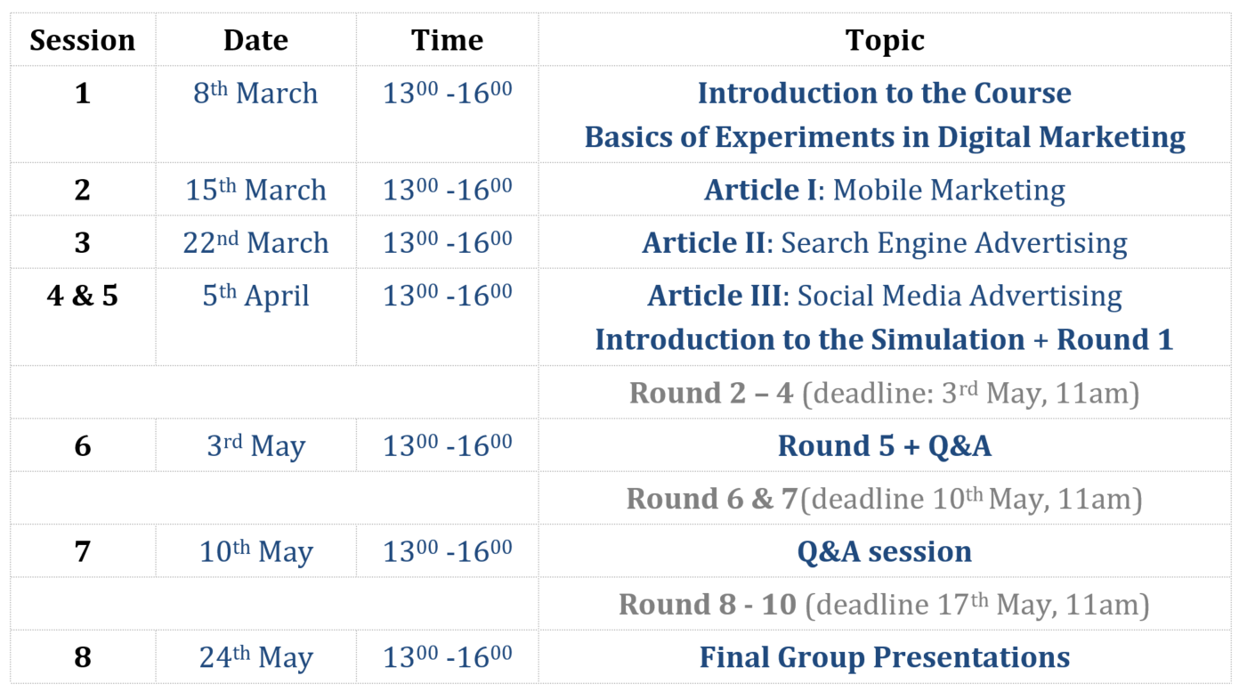Syllabus
Registration via LPIS
| Day | Date | Time | Room |
|---|---|---|---|
| Tuesday | 03/08/22 | 01:00 PM - 04:00 PM | LC.2.064 PC Raum |
| Tuesday | 03/15/22 | 01:00 PM - 04:00 PM | LC.2.064 PC Raum |
| Tuesday | 03/22/22 | 01:00 PM - 04:00 PM | LC.2.064 PC Raum |
| Tuesday | 03/29/22 | 01:00 PM - 04:00 PM | LC.2.064 PC Raum |
| Tuesday | 04/05/22 | 01:00 PM - 04:00 PM | LC.2.064 PC Raum |
| Tuesday | 05/03/22 | 01:00 PM - 04:00 PM | LC.2.064 PC Raum |
| Tuesday | 05/10/22 | 01:00 PM - 04:00 PM | D2.-1.019 Workstation-Raum |
| Tuesday | 05/24/22 | 01:00 PM - 04:00 PM | LC.2.064 PC Raum |
Imagine the following scenario:
You are working for Buhi Supply Co., a bag and apparel company that’s been doubling in size for the past five years. As the junior digital marketing specialist intern, you are responsible for the company’s digital marketing efforts (search engine advertising, landing page optimization, display advertising and shopping ads). That means you manage a $50,000 budget!
This is all part of a simulation called Stukent – The Digital Marketing Simulation, which allows you to test different keywords and bidding strategies in search engine advertising (SEA), test different versions of display advertising to find new customers and reach out to your existing customer base, and optimize your landing pages. All while you compete against other companies selling similar products.
After completing this course, the students will be able to:
1. calculate the most important metrics in order to optimize digital marketing campaigns,
2. describe the importance of experiments for digital marketing in various contexts, and identify the differences between the various forms of experiments that can be done in a digital environment (e.g., A/B testing, difference-in-difference designs, etc.),
4. create search campaigns: select and optimize keywords and their bids, organize ad groups and ads,
5. conduct landing page optimization,
6. identify and analyze key performance indicators and use analyses to make qualified recommendations for improving campaigns,
7. organize, create, and optimize interest and remarketing display ads,
8. organize, create, and optimize shopping ads,
9. effectively communicate the chosen strategy and anaylsis in a presentation.
This course will be held in presence or distance mode, depending on the current WU regulations regarding the pandemic.
Attendance of at least seven out of the eight classes is required. In special instances, there will be a possibility to compensate for one additional absence on individual basis.
Session on 29.03.2022 was cancelled because of the instructor's positive PCR test. Students were informed of this via email.
Phase 1: Lectures & articles
- Introduction to the course and digital marketing basics
- Article I: Direct Marketing
- Article II: Search Engine Advertising
- Article III: Social Media Advertising
Article presentations are a group task. You will be divided in groups of 4 or 5.
For all articles, you will be asked to prepare and submit a presentation and be prepared to talk about it in class.
After talking about the articles, you will get some practical input on direct marketing, paid search marketing and social media marketing. This part is prepared in collaboration with a digital marketing practitioner, to ensure the most up-to-date knowledge. We will talk about the process of creating different marketing campaigns: objectives and KPIs, best copy practices, audience segmentation and targeting options, campaign monitoring and optimization, and finally performance measures and result analysis.
Phase 2: Digital Marketing Simulation
- Introduction & Round 1 - in class - 5th April
- Rounds 2 - 4 - at home - deadline: 3rd May, 11am
- Round 5 and Q&A - in class - 3rd May
- Rounds 6 & 7 - at home - deadline: 10th May, 11am
- Q&A: Group Session - in class - 10th May
- Rounds 8 -10 - at home - deadline: 17th May, 11am
All rounds are played individually.
Phase 3: Final presentations
At the end of the simulation, you will work in groups again to create a summary of the strategy your team members chose for their simulation. Your task is to dive deep into the datasets of all your team members, analyze your decisions and campaigns as well as to benchmark your results. What differences can you find in the approaches? What worked well or not so well? What directions would you give for Buhi’s future digital marketing efforts?
The review should include thorough data analysis, presented in an approachable way. Think of it as a reporting presentation you would give your boss at the end of a campaign.

The course has 4 ECTS, which translates into a workload of 100 hours, 24 hours of which are contact hours in the classroom.
Weights for each grading component:
• 30% of the final grade is based on presentations on the three articles.
• 10% of the final grade is based on active participation in the classes.
• 45% of the final grade is based on the results and rank in the 10 rounds of the simulation.
• 15% of the final grade is based on the final presentation.
Bonus Task: In addition, you will receive a maximum of 15 bonus points for a summary of an article about online shopping. .
The transformation of the grade:
• 1 (sehr gut / excellent): 100% - 90% of all points
• 2 (gut / good): 89% - 80% of all points
• 3 (befriedigend / satisfactory): 79% - 70% of all points
• 4 (genügend / sufficient): 69% - 60% of all points
• 5 (nicht genügend / fail): Below 60% of all points
I am happy to answer your questions - feel free to send me a short email (alicja.grzadziel@wu.ac.at) if you would like to have a call or talk in person. I will try to be available in the classroom (or online) after classes and during the breaks.
Back